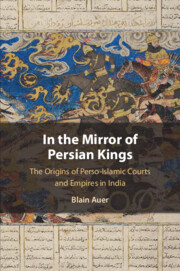Book contents
- In the Mirror of Persian Kings
- In the Mirror of Persian Kings
- Copyright page
- Dedication
- Contents
- Figures and Maps
- Maps
- Preface: In the Mirror of Persian Kings in India
- Abbreviations
- A Note on Transliteration
- 1 The History of Persian Kingship and Persianization in South Asia
- 2 Kings in History
- 3 Warrior King
- 4 Theory and Application of Persianate Political Ethics in India
- 5 The Pen, the Sword, and the Vizier
- Conclusion
- Bibliography
- Index
4 - Theory and Application of Persianate Political Ethics in India
Published online by Cambridge University Press: 17 April 2021
- In the Mirror of Persian Kings
- In the Mirror of Persian Kings
- Copyright page
- Dedication
- Contents
- Figures and Maps
- Maps
- Preface: In the Mirror of Persian Kings in India
- Abbreviations
- A Note on Transliteration
- 1 The History of Persian Kingship and Persianization in South Asia
- 2 Kings in History
- 3 Warrior King
- 4 Theory and Application of Persianate Political Ethics in India
- 5 The Pen, the Sword, and the Vizier
- Conclusion
- Bibliography
- Index
Summary
Justice is the central feature of political ethics in Islamicate contexts. Nearly all of the sultans of India made justice the cornerstone of their political ethics. Justice was highlighted in nearly all forms of courtly literary production. Where did the ethical norms of justice come from? This chapter treats how the example of the pre-Islamic Persian kings served as a principal model of the just king.
- Type
- Chapter
- Information
- In the Mirror of Persian KingsThe Origins of Perso-Islamic Courts and Empires in India, pp. 121 - 160Publisher: Cambridge University PressPrint publication year: 2021

